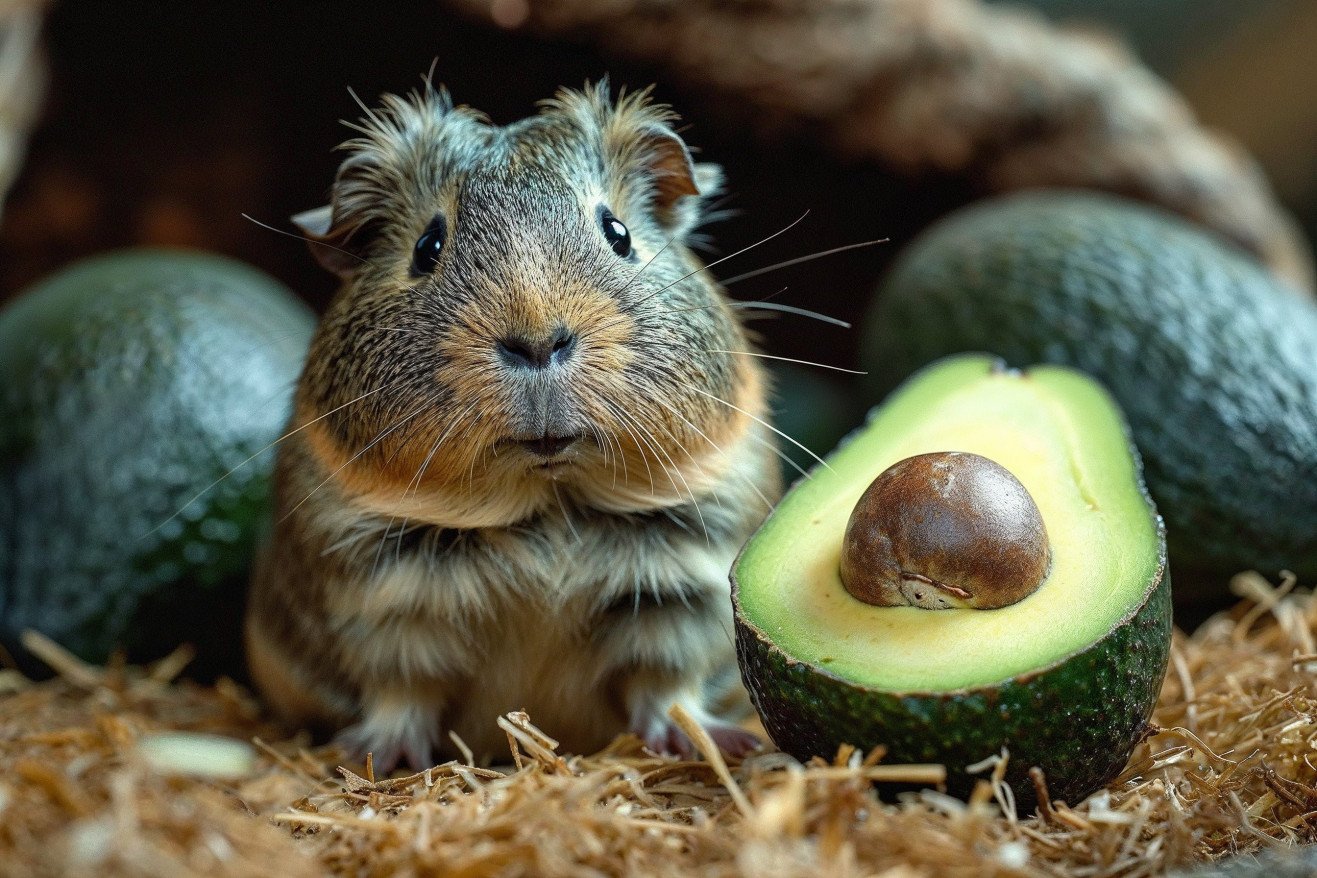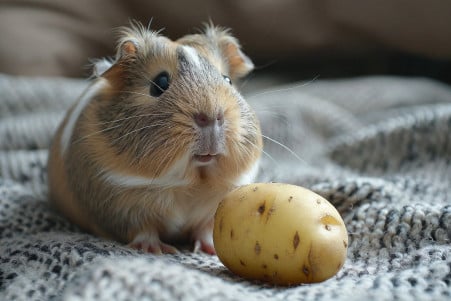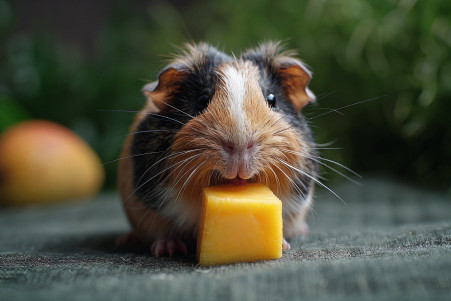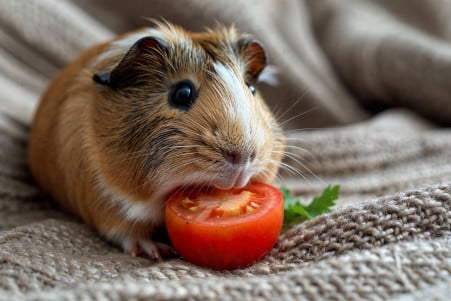Can Guinea Pigs Eat Avocado? Essential Safety Tips
20 January 2024 • Updated 28 January 2024

Avocado is often celebrated for its health benefits, but can guinea pigs enjoy it as well? Unfortunately, avocados are not safe for guinea pigs to eat due to their toxicity and high fat content. Avocados contain persin, which is known to cause a range of health problems and even death in guinea pigs. Instead, opt for other fruits and veggies that are safe for your pet.
In this article, we’ll reference veterinary research and nutritional recommendations to detail the dietary requirements and limitations of guinea pigs. We’ll also discuss studies on toxic compounds such as persin in avocados and explore why these compounds are so dangerous for our little furry companions.
With this knowledge of the science, you can make sure you’re feeding your guinea pig the healthiest and most nutritious diet possible, which will help them stay healthy and happy.
Can guinea pigs eat avocado?
Persin Toxicity in Guinea Pigs
The avocado plant, including the fruit, leaves, and seeds, is rich in persin, a fungicidal toxin. Although persin is a fat-soluble molecule that is relatively nontoxic to humans in low doses, it is deadly to guinea pigs and other animals.
According to a study by J K MacLeod in PubMed, persin can cause severe damage to the heart and mammary glands in animals, with the most severe damage occurring at doses of more than 100 mg/kg.
In guinea pigs, persin consumption causes symptoms that are worrisome, including tachycardia, tachypnea, and potentially fatal myocardial damage. According to the Merck Veterinary Manual, avocado toxicosis is hard to diagnose because there are no specific tests, and treatment is mainly supportive and based on clinical signs.
Studies of persin’s effects on domestic animals have shown that it has a dark side and a silver lining; while it is toxic, it has also been found to have potential in cancer studies, as it can induce apoptosis in certain breast cancer cells. This paradoxical effect demonstrates the complexity of persin and the importance of guinea pig owners avoiding avocados to protect their pets.
How to Make Sure Your Guinea Pig Has a Healthy Diet
Guinea pigs have very specific dietary requirements that need to be met in order for them to be healthy. According to FOUR PAWS International, these small herbivores need a diet that is high in fiber and vitamin C, which they can’t produce on their own.
A well-rounded guinea pig diet will be made up mostly of hay and fresh grass, which will help with dental and digestive health. In addition, you can add in some fresh vegetables like bell peppers, broccoli, and Romaine lettuce, and fruits like kiwi and strawberries to make sure your pet is getting enough vitamin C and to give them some variety.
It’s important to make sure that you don’t feed your guinea pig high-fat or toxic foods, including avocado, which can cause serious health problems.
The PDSA warns that without the right nutrients, guinea pigs can suffer from problems like scurvy (which is caused by a lack of vitamin C) and obesity (which is caused by eating too many calories).
It’s important to make sure that you’re feeding your guinea pig the right amount of food and that you’re feeding them on a regular schedule in order to keep them healthy. By doing this, you’ll be able to avoid nutritional deficiencies and obesity and help your guinea pig be as healthy as possible.
Metabolic Vulnerabilities: The Reason Avocados Are Toxic to Guinea Pigs
Guinea pigs have unique metabolic systems that are quite different from those of other animals, including humans. In a study published in PubMed, M Peak notes that guinea pigs have lower rates of beta-oxidation, the process of breaking down fatty acids, than rats.
This metabolic difference means that guinea pigs are less able to process high-fat foods like avocados, and it makes them especially toxic to guinea pigs. The study also found that guinea pigs have lower sensitivity to beta-oxidation–inhibiting compounds, which could further complicate their ability to process the fats in avocados.
Moreover, a PMC article by Maria Luz Fernandez points out that guinea pigs have lipoprotein metabolism that is similar to that of humans. Their plasma contains most of their cholesterol in LDL, just like humans, and they have moderate rates of hepatic cholesterol synthesis and catabolism. This similarity underscores the potential human-like response to dietary cholesterol but also shows that they can’t handle compounds like persin.
Understanding these metabolic differences is key to realizing why substances that are harmless to humans can be toxic to guinea pigs. It’s the interaction of these metabolic factors that leads to the need for strict dietary limitations, like the prohibition of avocados, to protect guinea pigs from accidental poisoning. By making the right dietary choices, guinea pig owners can help ensure their pets’ well-being, focusing on foods that are both safe and healthy.
Healthy Guinea Pig Diet: More Than Just Avocado
If you want to make sure your guinea pig is getting a well-rounded diet, you can supplement their pellets with a variety of fruits and vegetables. The Humane Society notes that guinea pigs require vitamin C in their diet because they can’t produce it themselves.
Red or green bell peppers and broccoli are great daily options, while vitamin C–rich fruits like kiwi and strawberries can be given as an occasional treat. The RSPCA recommends that guinea pigs are fed leafy greens like kale and fresh grass as a staple to help with digestion and dental health.
When you’re introducing new foods, make sure to do so slowly to avoid upsetting their stomachs, which can be sensitive to sudden changes. Small Pet Select suggests that you opt for options like endive and dandelion greens instead of iceberg lettuce, which can be more likely to cause problems. You should also avoid high-oxalate foods like spinach, which can lead to urinary issues.
To make sure your guinea pig has an enjoyable mealtime, make sure to offer them a variety of foods and make sure to feed them in moderation. You can offer fresh vegetables daily in a portion size of a half to one cup per guinea pig, while fruit portions should be kept small and offered less frequently.
Make sure to always provide them with fresh, clean water and an unlimited supply of hay to keep them in the best health. If you stick to these guidelines, you’ll help ensure that your pet has a long, happy, and healthy life.
Key Takeaways: Can Guinea Pigs Eat Avocado?
In short, while avocados are a healthy food for humans, guinea pigs cannot eat them because they contain persin, which is poisonous to guinea pigs. Our conversation covered the many dangers of feeding avocados to guinea pigs, including heart problems and difficulty breathing. It’s important to note that guinea pigs’ unique digestive systems can make foods that are safe for humans very dangerous for them.
We’ve also once again stressed the importance of feeding guinea pigs a diet that meets their specific nutritional needs, which includes high fiber and vitamin C and is based on hay, fresh grass, and certain vegetables and fruits. Being a good pet owner means not only loving your pet but also making informed decisions about their care.
Always talk to a vet for personalized information about what to feed your guinea pig. And remember, there are plenty of healthy foods that you can feed your guinea pig instead of avocado, including bell peppers, broccoli, and Romaine lettuce.
By keeping this information in mind, you can help ensure that your beloved pet lives a long, healthy life.


